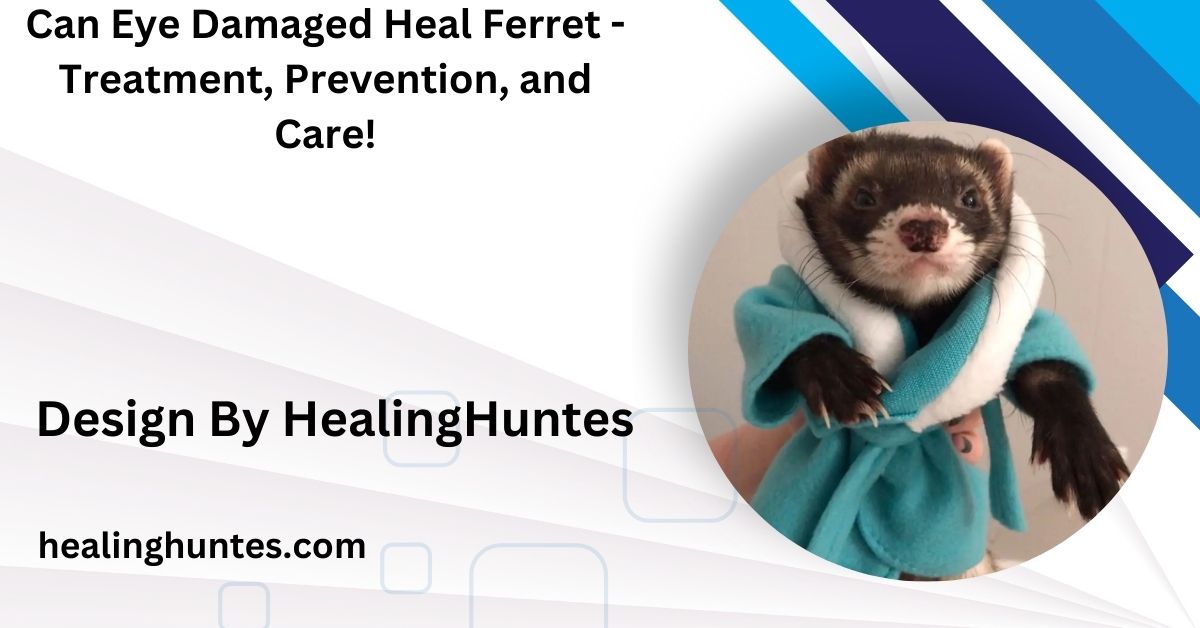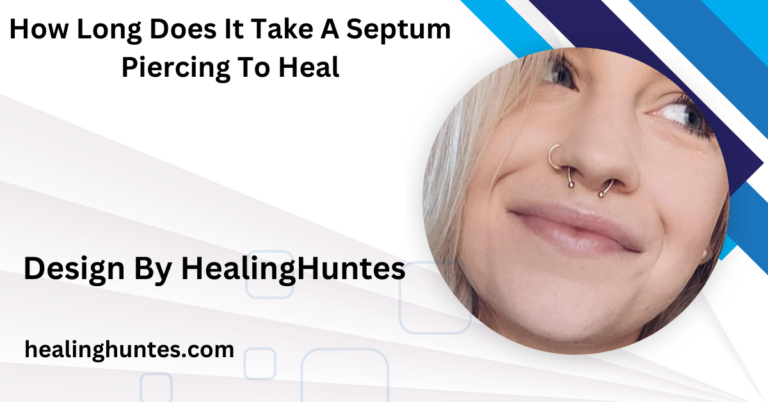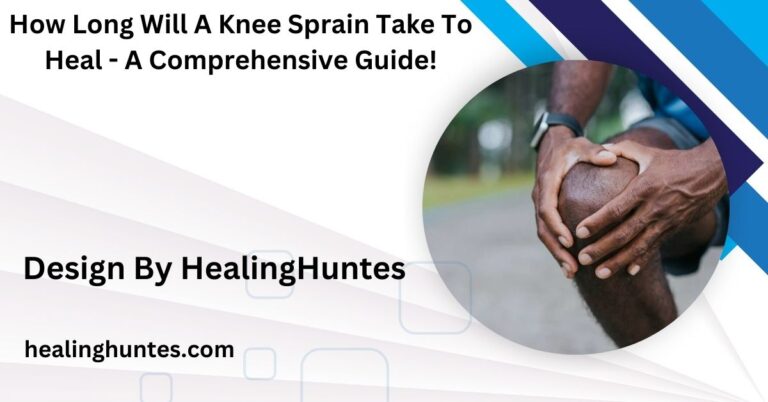Can Eye Damaged Heal Ferret – Treatment, Prevention, and Care!
Ferrets are prone to eye injuries, but with timely vet care and home management, minor issues can heal, while severe cases may need surgery to prevent vision loss.
This article will delve into the causes, symptoms, treatment options, and prevention strategies for eye damage in ferrets.
Common Causes of Eye Damage in Ferrets:
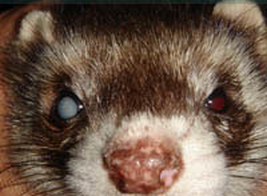
Ferrets, being naturally curious and active, are at a higher risk of eye injuries. Common causes include physical trauma from rough play or accidents, such as bumping into objects or tussling with other pets. Foreign objects like dust or debris can easily get lodged in their eyes, leading to irritation or infection. Additionally, certain underlying health conditions like dental disease or adrenal issues can indirectly affect their eye health, further increasing the risk of injury.
Some of the most common causes of eye damage include:
- Trauma or physical injury: Rough play, bumping into objects, or fights with other animals can cause eye injuries.
- Foreign objects: Dust, debris, or small particles can get lodged in a ferret’s eye, leading to irritation or infection.
- Infections: Bacterial, fungal, or viral infections can cause inflammation or ulcers on the surface of the eye.
- Underlying health conditions: Certain diseases, such as adrenal disease or dental problems, can affect the eyes.
Symptoms of Eye Damage in Ferrets:
Early detection of eye damage in ferrets is essential to prevent serious complications, as they often hide pain. It’s important to watch for subtle signs like redness or swelling, which may indicate inflammation, or discharge from the eye, signaling infection. Other symptoms include constant squinting or blinking, suggesting discomfort, and cloudiness in the eye, which could point to damage or infection. Observing these signs and acting quickly can help ensure timely treatment and recovery.
- Redness or swelling: Inflammation around the eye can signal an injury or infection.
- Discharge: Watery, thick, or colored discharge from the eye is a common sign of infection.
- Squinting or blinking: If your ferret is squinting or constantly blinking, it may be trying to cope with pain or discomfort.
- Cloudiness or film: A cloudy appearance or film over the eye could indicate damage to the cornea or an underlying condition.
- Pawing at the face: If your ferret is rubbing its face or scratching near the eye, this may be a sign of irritation or injury.
Also Read: How Long Does A Lip Piercing Take To Heal – Complete Healing Guide!
Can Eye Damage Heal in Ferrets:
The ability of a ferret’s eye to heal depends on the extent of the damage. Minor injuries, such as scratches or mild irritation, can often heal with proper care and treatment. However, more severe injuries, like deep corneal ulcers, infections, or trauma, may require veterinary intervention to prevent permanent damage.
Minor Injuries:
Small scratches on the cornea, caused by dust or debris, can heal relatively quickly, especially if treated early with appropriate eye drops or ointments. In most cases, the injury will resolve within a few days, but it’s important to monitor the eye to ensure that it heals fully without infection.
Severe Injuries or Ulcers:
More severe injuries, such as deep corneal ulcers or trauma that affects the structure of the eye, may take longer to heal and often require more intensive treatment. Without prompt veterinary care, these injuries can lead to blindness or the loss of the eye. Depending on the extent of the damage, surgical intervention may be necessary to preserve vision or prevent further complications.
Diagnosis and Treatment of Eye Damage in Ferrets:
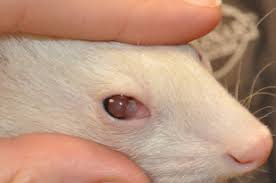
If you think your ferret has an eye injury, seeking a vet’s diagnosis is crucial to avoid complications. A veterinarian will perform a detailed examination to assess the type and severity of the injury, often using tests like a fluorescein stain to detect corneal damage. Based on the diagnosis, they’ll recommend the most effective treatment plan to promote healing and prevent long-term harm.
Veterinary Examination:
During the examination, the vet will assess the eye for any visible damage, such as scratches, ulcers, or signs of infection. They may also perform a fluorescein stain test, where a special dye is applied to the eye to highlight any corneal ulcers or damage.
Treatment Options:
- Antibiotic eye drops or ointments: To prevent or treat bacterial infections.
- Anti-inflammatory medications: To reduce swelling and pain in the eye.
- Corneal repair surgery: In severe cases, surgery may be required to repair damage to the eye and save the ferret’s vision.
- Pain management: Medications may be prescribed to keep your ferret comfortable while the eye heals.
Also Read: Will Dry Socket Heal On Its Own – Everything You Need to Know!
Home Care for a Ferret with Eye Damage:
- Administer medications as prescribed: Ensure that you give any medications, such as eye drops or ointments, exactly as your vet has prescribed. Consistency is key to successful healing.
- Keep the environment clean: Make sure your ferret’s bedding and living area are clean to reduce the risk of infection.
- Monitor for signs of improvement: Keep an eye on your ferret’s condition. If symptoms worsen or the injury doesn’t improve after a few days, contact your vet for a follow-up.
- Prevent your ferret from scratching the eye: To prevent further damage, you may need to use an Elizabethan collar (cone) to stop your ferret from scratching or rubbing its eye while it heals.
Preventing Eye Injuries in Ferrets:

- Supervised playtime: Keep an eye on your ferret during playtime, especially if it interacts with other animals. Avoid rough play that could lead to injuries.
- Clean living environment: Regularly clean your ferret’s cage or play area to reduce the risk of foreign objects getting into its eyes.
- Check for signs of health issues: Routine vet check-ups can help detect underlying conditions that might affect your ferret’s eyes, such as adrenal disease or dental problems.
FAQ’s
1. How long does it take for a ferret’s eye injury to heal?
Healing time varies from a few days for minor injuries to several weeks for more severe cases with proper treatment.
2. Can I treat my ferret’s eye injury at home?
Minor injuries may be managed at home with vet-prescribed treatments, but all injuries should be diagnosed by a vet.
3. What happens if an eye injury in a ferret is left untreated?
Untreated eye injuries can lead to infection, pain, and permanent vision loss, possibly requiring eye removal.
4. Is surgery always required for severe eye injuries in ferrets?
Surgery is not always required but may be necessary for severe trauma or deep ulcers to save vision.
5. How can I prevent eye injuries in my ferret?
Supervise playtime, maintain a clean environment, and schedule regular vet check-ups to prevent eye injuries and health issues.
Conclusion
Eye damage in ferrets can range from minor scratches to serious injuries requiring surgical intervention. While some injuries can heal on their own with proper care, it’s always best to consult a veterinarian if you notice any symptoms of eye damage. Early diagnosis and prompt treatment are essential to protecting your ferret’s vision and overall health.
